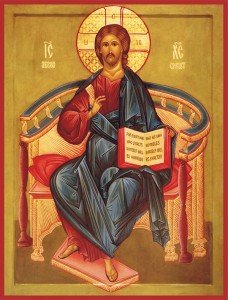 This Easter, for some reason, I have decided that I must begin sharing thoughts about REDEMPTION and SALVATION even though I have written two pages about the meaning of Holy Pascha. It is my current thought that I shall share these ideas during this Pentecost Period which extends from Pascha to Pentecost. Why? Because it has become more and more evident to me that the Eastern and Western Churches have a different understanding of these essential religious ideas. It is not my intention in doing this to, in any way, diminish either of these understandings but to highlight the fact that there can be differences of interpretation within our Christian faith. These differences come from our theology, spirituality and liturgical practice. I would encourage all of my readers, if they decide to follow this article, to not judge one understanding right and the other wrong, realizing that in truth all of these ideas are a matter of faith and the understanding of the Eastern Church is as valid as that of the Western Church.
This Easter, for some reason, I have decided that I must begin sharing thoughts about REDEMPTION and SALVATION even though I have written two pages about the meaning of Holy Pascha. It is my current thought that I shall share these ideas during this Pentecost Period which extends from Pascha to Pentecost. Why? Because it has become more and more evident to me that the Eastern and Western Churches have a different understanding of these essential religious ideas. It is not my intention in doing this to, in any way, diminish either of these understandings but to highlight the fact that there can be differences of interpretation within our Christian faith. These differences come from our theology, spirituality and liturgical practice. I would encourage all of my readers, if they decide to follow this article, to not judge one understanding right and the other wrong, realizing that in truth all of these ideas are a matter of faith and the understanding of the Eastern Church is as valid as that of the Western Church.
It seems that even from the very beginning of Christianity the followers of Jesus were asking: Who is Jesus? In fact Jesus asks His disciples, Who do you say Jesus is? Jesus, of course, is the ultimate mystery of mysteries. We all struggle to understand who He is. Like our struggle with who God is, we tend to want to define Him, albeit, we are truly unable to do so. All that the Ecumenical Councils could do is say Who Jesus is not! Although He is God and Man, the Council Fathers said, we know that if He is man He cannot be controlled by His divine nature, otherwise He could not be truly man.
From our struggle with the question of Who is Jesus, other questions naturally arise. There are three questions that I would have my readers keep in mind during the coming weeks, when they read this article. Those questions are: What does it mean when we declare that Christ has saved us? From What has He saved us, and for what purpose has He saved us?
Now it is important to note that as Ukrainian Greek-Catholics, we have, in so many ways, accepted the Roman Catholic answers to these three very important questions. That is because of our real desire, I believe, to be recognized as Catholics and the pressures that have come from trying to be in union with the Catholic Church.
Western Christians seem to think about salvation or redemption in chiefly forensic terms. The word merit is directly connected to the Cross. Their thoughts about salvation/redemption can be summed up by these words” Christ, “by his one oblation of himself once offered”, made “a full, perfect, and sufficient sacrifice, oblation, and satisfaction, for the sins of the whole world.” Somehow Christ’s death upon the Cross has made up for the sins of all humans (I wonder how many of my readers think this is true?)
Many probably think as St. Anselm did, who taught that the sacrificial death of Jesus satisfied the requirements of God’s infinite honor, which was offended by sin. Others, more simply, would describe the work of salvation as answering the divine standards of justice; Jesus “corrected” man’s relationship to God within the structure of created reality.
Others, I believe, probably see the idea of salvation/redemption in the ideas of another theory, namely the “penal substitutionary atonement” theory, believing that Jesus, by His sufferings and death, had propitiated the divine wrath, in the same that God laid on Him – in place of us – the punitive retribution deserved by our sins. According to this theory, God’s Son bore the punishment that properly was ours. Somebody had to be punished, so God punished Jesus in our stead. This presumes that God is in the business of punishment (many would like Him to be so that the “bad” at least suffer in eternity).
In all of these Western theories, these words are present: meritorious cause, satisfaction, and punishment. I must confess that I do not believe that Jesus was punished on the Cross. I also do not believe that God took out His anger on His Son. I have made sure that the words merit and satisfaction never appear in my preaching or writing.
While it is true that in my earlier years I did think of the death of God’s Son as repairing the injury that human sin inflicted on the divine honor, I have always felt that these theories were lacking in something based on my belief of Who God IS.
This basic belief has always caused me to search for a different answer to the question: Why did Jesus die on the Cross? I have found that the Eastern Church’s ideas about redemption and salvation are much more positive.
